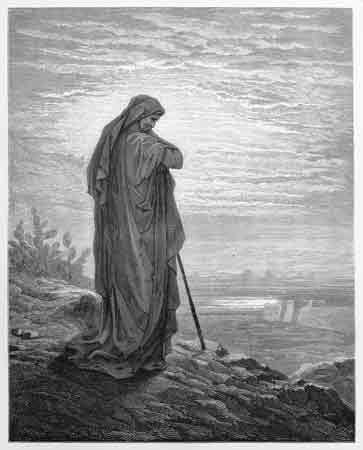Amos: Difference between revisions
No edit summary |
No edit summary |
||
| Line 1: | Line 1: | ||
[[File:Amos.jpg| | [[File:Amos.jpg|left]] | ||
Amos prophesied during the reign of Jeroboam II, King of Israel, and of Uzziah of Judah, which places him in the first half of the 8th century BC. | Amos prophesied during the reign of Jeroboam II, King of Israel, and of Uzziah of Judah, which places him in the first half of the 8th century BC. | ||
Revision as of 19:23, 11 October 2020

Amos prophesied during the reign of Jeroboam II, King of Israel, and of Uzziah of Judah, which places him in the first half of the 8th century BC.
Amos appears to from Tekoa, a town in Judah south of Jerusalem, but his prophetic mission was in the northern kingdom. He is called a "shepherd" and a "dresser of sycamore trees The writing suggests he was a man of education rather than a poor farmer.
He also appears to have utilized an ancient hymn within his prophecy.[1] He also seems to be repeating the prophecy from the Book of Joel which makes sense because it such a common theme of creation and man's relationship with God and the world.
We live in a cause and effect universe and the rules are built into creation along with the consequences. The prophets are men who see the patterns in these rules and apply them to their times, often repeating the essential elements for generation after generation.
The book of Amos puts his people on the same level as the surrounding nations. The God of creation requires the same purity, morals and ethics from which there is no escape.
All nations or people that rise up against the kingdom of God and the precepts upon which it functions, even Israel and Judah will not be exempt from the consequences or judgment of God built into creation.
Understanding what idolatry is and learning to distinguish between unjust ways and The Way of righteousness is key to a successful out come for any and all societies.
Any nation or people that represents YHWH, His Name/personality will be made protected from anything or anyone that profanes, functions contrary to the name or identity or Character of God. God's name must be exalted for the people to be exalted to something that might be called eternal life.
An example of a way that would produce the opposite results is what Polybius speaks of concerning the people degenerating into perfect savages when they become accustomed to living at the expense of others and depending for their livelihood on the property of others.
"The Day of the Lord" is simply that point at which the consequences of doing contrary to the formula for eternal life catches up with a people or nation. Those who understand the true meaning of these prophecies can see the process as it unfolds and may provide for it. But the most important thing is to turn away from the systems of idolatry, the covetous practices, and the greed and avarice that accompanies them.
Amos
Amos 1 | Amos 2 | Amos 3
Amos 4 | Amos 5 | Amos 6
Amos 7 | Amos 8 | Amos 9
Preceded by: Joel
Followed by: Obadiah
Audio and Video Archives
2024 |
2023 |
2022 |
2021 |
2020 |
2019 |
2018 |
2017 |
2016 |
2015 |
2014 |
2013 |
2012 |
2011 |
2010 |
Misc |
AllAud |
Broadcasts |
Books |
Bible |
Videos |
YouTube
Keys of the Kingdom Audio Archive
Bible |
Bible Index |
Bible References |
Biblical bunch |
Sophistry |
Modern Christians |
Whosoever believeth |
Religion |
Bible_terms |
Early non Bible authors
Athenagoras of Athens | Methodius of Olympus | Theophilus or Ignatius of Antioch
Hippolytus of Rome | Justin the Martyr | Jerome | Augustine of Hippo |
Epistle of Mathetes | Gospel of James | The Gospel of Thomas |
Philo Judaeus or Philo of Alexandria and The Allegories of the Sacred Laws
Polybius | Plutarch | Seneca | Tacitus | Suetonius |
Marcus Tullius Cicero | Celsus | Diotrephes |
People in the Bible
Paul the Apostle |
Melchizedek |
Moses |
Cain |
Caesar |
Herod |
Jesus |
John the Baptist |
Matthew |
Mark |
Luke |
John |
Nimrod |
Abraham |
Essenes |
Pharisees |
Sadducees |
Zealots |
Julius Caesar | Augustus Caesar | Tiberius | Nero |
Historical People
Buddha |
Constantine |
Eusebius |
Ambrose |
Augustine of Canterbury |
Lady Godiva |
Vespian |
Diocletian |
Manichaeism |
John Wycliffe |
- ↑ Chapter 4.13; 5.8–9; 8.8; 9.5–6.